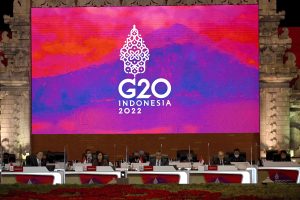… [A]s the Chair of the G-20, Indonesia can encourage cooperation and initiate concrete results in the three priority sectors, which are crucial for recovery. This is a momentum for Indonesia to earn credibility or global trust in leading the global recovery efforts. Credibility is invaluable capital in diplomacy and foreign policy.
– From an October 2022 statement by the Indonesian Ministry of Foreign Affairs
By mid-2021, there were banners, posters and billboards on the main streets of Indonesia’s major cities displaying information about Indonesia’s G-20 presidency, which began on October 31, 2021. It was a display of how, for Indonesia, the G-20 presidency faces two audiences: the domestic and the international.
Promoting the G-20 and the 2022 G-20 presidency to the domestic audience was important for the Indonesian government, mainly to ensure support and success. Approaching the presidency, the government carried out activities promoting it domestically, in particular raising awareness of the “benefits” of the G-20 and the hosting of the annual summit for Indonesia’s economy. In a speech in November 2021, Indonesian President Joko “Jokowi” Widodo pressed for the country to make the most of its strategic position as the G-20 president to “prioritize national interests.” The government claimed that the G-20 presidency would bring many benefits to the economy, in foreign policy and in terms of social development, which include a direct impact on Indonesia’s economy by increasing the country’s foreign exchange earnings and a promotion of Indonesia’s openness for business.
For the international audience, the Indonesian government aimed to encourage cooperation and garner concrete results in three priority sectors: global health architecture, the digital transformation of the global economy, and the energy transition. These priorities make up the flagship agenda of the Sherpa Track working groups and engagement groups. With its own experience during the COVID-19 pandemic, in particular the hardship Indonesia faced as it struggled to keep the health system from being overloaded and the concessions it made to acquire batches of vaccines, Indonesia wants to promote solidarity in addressing the transnational crisis. Unequal global vaccine distribution, notoriously exemplified by trends of vaccine nationalism and hoarding, is a key issue that Indonesia has repeatedly highlighted in multiple international forums.
All of these objectives were expressed prior to assuming the G-20 presidency, as Indonesia was getting ready for one of the biggest tasks in its international affairs: leading the grouping of the world’s largest economies.

































